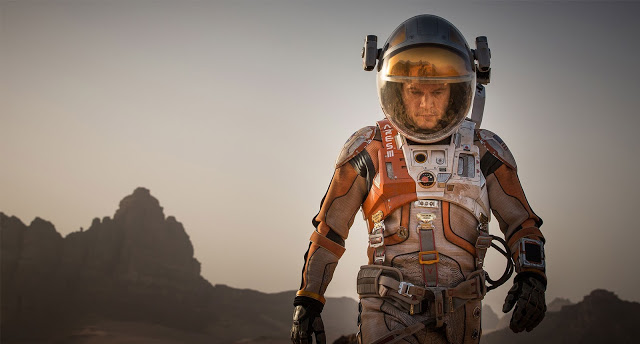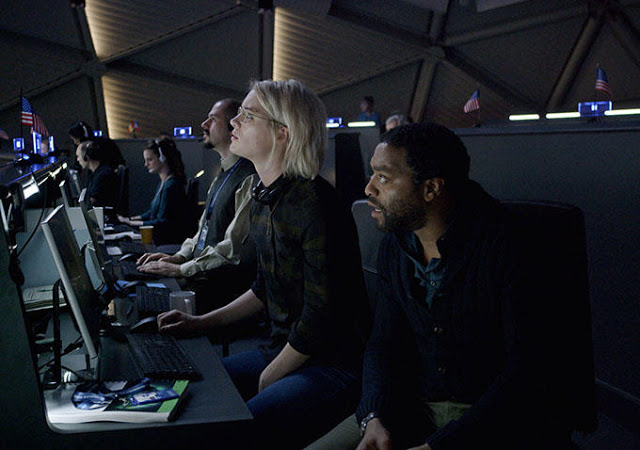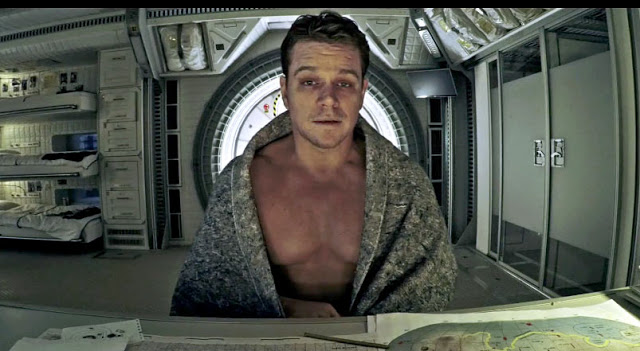The Martian is a movie about a man stranded on a deserted planet, first left for dead, then scrambling frantically to survive. You might think, from this brief and terrifying description, that it is a horror film, or at least a gritty survivalist fable—Cast Away in space, or Gravity on barren land. Yet the most surprising and satisfying thing about The Martian, which is based on a best-selling novel by Andy Weir and is directed with characteristic competence by Ridley Scott, is how much fun it is. Certainly, there are moments of dread, and the protagonist continually faces the prospect of imminent death. But for the most part, this film is warm, inviting, and even comforting. There may be gravity on Mars, but The Martian feels positively buoyant.
It doesn’t start out that way. In a brisk and chaotic prologue set on the red planet, a group of astronauts led by Commander Lewis (Jessica Chastain) attempt to fight through a storm of swirling debris. During the squall, a piece of equipment breaks loose and slams directly into the chest of Mark Watney, catapulting him off into the desolate distance. After a desperate search, Lewis has no choice but to abandon hope, and she and her crew hightail it out of there before Mars can claim five additional victims.
You do not need to have read the novel (I haven’t), nor seen the trailer, nor know anything beyond the fact that Mark is played by Matt Damon, to sense immediately that Mark is still alive. When he wakes, he staggers back to the Hab (an artificial habitat designed as a modest home base), yanks a piece of shrapnel out of his side, and staples the gaping hole in his abdomen shut. (In the venerable canon of characters stitching up their own wounds, this isn’t quite Pan’s Labyrinth good, but it still made me wince.) He then takes quick stock of his unfortunate situation—to recap, he is alone on Mars, with a limited supply of food, no method of communication, and no hope of rescue—and reaches the only rational conclusion: “fuck.”
But all is not lost. Mark is a botanist, and a brilliant one at that. (In a line that taps into the movie’s rich vein of humor, he describes himself as “the greatest botanist on this planet”.) And he approaches his predicament, which would have most of us cowering in fear and self-pity (I’m speaking for a friend), with uncommon pragmatism and composure. No food? He develops a plan to grow potatoes. No water? He creates some by combining hydrogen with oxygen and then burning. No friends? Time to concoct the galaxy’s longest-distance instant messaging program.
That last part is where things get tricky, and where The Martian becomes both more enjoyable and more routine. Excepting a curt statement from NASA director Teddy Sanders (a perfectly crisp Jeff Daniels) regarding Mark’s presumed fate, the movie spends its entire opening act on Mars. But it’s lonely up there, and while it’s possible to imagine the entire film taking place from Mark’s narrow perspective (think an interplanetary All Is Lost), such a strategy would undoubtedly try viewers’ patience. And so, as Mark resolves to locate a long-buried pathfinder and modify its technology to communicate with NASA, Scott returns the action to Houston, where Sanders and his team of ingenious, dedicated scientists resolve to do the impossible and bring Mark home.
And that, really, is what The Martian is about: smart people working together and solving problems. Much of the movie simply involves engineers brainstorming, proposing new ideas and troubleshooting newfound issues. This, naturally, involves quite a bit of talk, which is not a charge typically leveled against a Ridley Scott film. But the famed filmmaker of lean-and-mean sci-fi classics such as Alien and Blade Runner proves surprisingly agile at handling such verbose material, thanks largely to the efforts of screenwriter Drew Goddard. A longtime collaborator with Joss Whedon (and the director of modern horror classic The Cabin in the Woods), Goddard infuses the film’s many lengthy conversations with pep and wit, finding the perfect balance between hard science (Weir’s novel is renowned for its scientific scrupulousness) and light comedy (when Mark finally hears from his crew, the first message reads, “Sorry we left you behind, but we just don’t like you”). Scott also has the cachet to recruit talented character actors to play minor parts, and as befits a movie so devoted to the concept of collaboration, The Martian receives valuable contributions from its globally diversified cast; in addition to Daniels, there are Kristen Wiig as a harried PR guru, Sean Bean as an empathetic mission director, Donald Glover as a socially clumsy mathematician, Benedict Wong as a beleaguered propulsion engineer, Mackenzie Davis (currently rocketing to acclaim on Halt and Catch Fire) as a mission control analyst, and—best of all—the great Chiwetel Ejiofor as a supervisor who serves as Mark’s primary point of contact.
Of course, these stars are merely satellites orbiting the film’s sun. Matt Damon is the soul of The Martian, and he shoulders his burden with remarkable ease. It’s a performance fraught with danger: Too much gravitas would flood the movie with grandiosity, whereas too little would drain it of its power. Damon walks the tightrope, gracefully mining the absurdist comedy of Mark’s dire circumstances while also articulating the omnipresent potential for tragedy. In a clever cinematic maneuver, Scott provides Mark with a video diary, allowing him to break the fourth wall without poisoning the film’s structural integrity. Mark may be an astronaut, but he also proves a gifted standup comic, leading to hilarious moments such as when he dubs himself a “space pirate”, or when he criticizes Lewis’s predilection for disco music. (In the film’s giddiest scene, he does an improvised head-and-shoulder jig to Donna Summer’s “Hot Stuff”.) But as funny as Damon is, he never lets us forget Mark’s life-or-death stakes, whether he’s hastily slapping strips of duct tape on his helmet to seal a sudden crack, or quietly evoking the mammoth weight of his struggle.
But The Martian isn’t just about one man; it’s about many people working together to save one man. That makes for rich thematic material, but it also dilutes the film’s impact, especially in its disappointingly conventional third act. At that point, Scott spends considerable time with Mark’s crew, probing their willingness to risk their lives on a dangerous rescue mission. Scott conceives it as an unfathomable moral dilemma, but though the crew members are persuasively portrayed by talented actors (in addition to Chastain, Michael Peña and Kate Mara have pleasant parts), they lack real dimension; they’re selfless heroes through and through, which makes them brave but not all that interesting. And the rescue itself, even if rooted in plausible science, deflates into improbable feats of superheroism, a betrayal of the thoughtfulness and discipline that came before.
That rescue is still fun to watch, thanks to suitable special effects and Scott’s canny embrace of 3-D technology, which he wielded with even greater force in Prometheus. (Here, the 3-D cuts both ways; it’s terrific during the set pieces—first enhancing depth of field on Mars, then expanding our comprehension of the sheer vastness of space—but it mars the film’s earthbound scenes, which are so dim that you feel like you’re watching through sunglasses.) But it lacks the sublime elegance of 2001: A Space Odyssey or even the operatic grandeur of Interstellar (speaking of which, The Martian is officially the second-best space movie starring Damon and Chastain to arrive in the last 11 months). Worse, throughout the sequence, Scott repeatedly cuts back to mission control as NASA operatives stare anxiously at LCD screens (a motif that recalls both Apollo 13 and, regrettably, Armageddon), which is like panning to the crowd during the final play of the Super Bowl.
At the same time, it is difficult to blame this movie, which so skillfully and methodically builds suspense and excitement, for finally cashing in its chips. Besides, the lasting impression here is not the finale but the setup. The outcome is irrelevant; The Martian is all about process. “Work the problem,” Lewis calmly instructs her crewmates during a seemingly catastrophic crisis, and her lucid response in the face of apparent disaster doubles as a thesis statement for the entire film. The Martian may be a movie about a man marooned on another planet in our solar system. But the virtues it dexterously extols—teamwork, perseverance, and good old-fashioned storytelling—are decidedly of this earth.
Jeremy Beck is the editor-in-chief of MovieManifesto. He watches more movies and television than he probably should.



